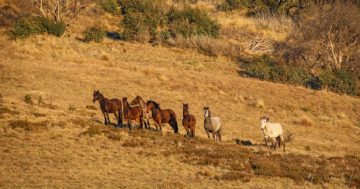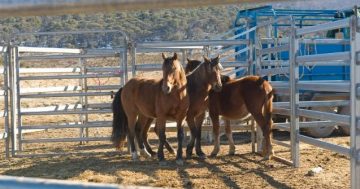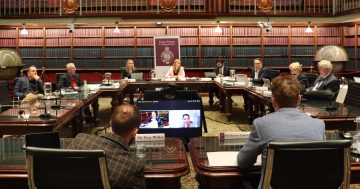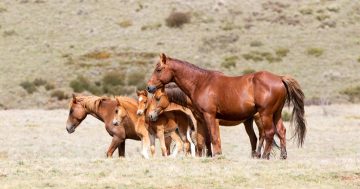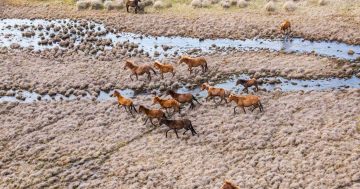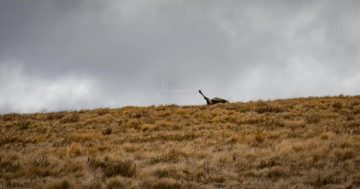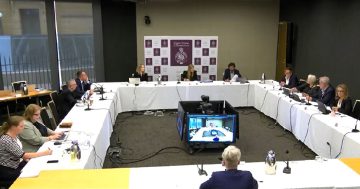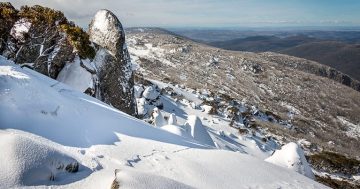
Wild horses in Kosciuszko National Park are lured to trap yards using molasses and salt bait stations, before being transported out for distribution among rehomers. Photo: File.
The NSW National Parks and Wildlife Service (NPWS) has enacted stricter guidelines for its wild horse rehoming program following public outcry at the discovery of an illegal slaughterhouse in the Riverina region earlier this year.
The new regulations have been introduced as the result of a formal investigation into the program after 500 horse carcasses were found at the property of an approved rehomer – a person approved by the NPWS to receive wild horses removed from Kosciuszko National Park (KNP) – near Wagga Wagga in April.
The two-month investigation, conducted by the NSW Department of Climate Change, Energy, the Environment and Water (DCCEEW), revealed serious deficiencies in the NPWS’s oversight of the rehoming program, which is part of a broader strategy to manage the growing population of wild horses, or brumbies, in KNP.
The review found that the NPWS had failed to conduct proper due diligence on the Wagga Wagga rehomer who had been responsible for handling nearly 30 per cent of all wild horses rehomed under the program since 2021.
This included twice approving the individual to take horses, despite inconsistent applications and failure to meet reporting requirements, such as submitting “fate returns” to track the horses’ post-rehoming welfare.
It was also found, more broadly, that while most rehomers were compliant with the registration process, there were gaps in the verification of applicants’ experience and the adequacy of their facilities.
Additionally, the lack of consistent follow-up inspections meant that, in some cases, horses were being rehomed to individuals or facilities that did not meet the minimum welfare standards required by the program.
The review also highlighted the need for enhanced collaboration between NPWS and other agencies, such as Racing NSW and the RSPCA (NSW), to strengthen information sharing and improve overall management.
As a result of these findings, the DCCEEW recommended a suite of reforms, including more rigorous screening of applicants, improved communication between agencies, and stronger mechanisms to ensure the welfare of rehomed horses.
In response, the NPWS pledged to implement the changes, aiming to restore public confidence and ensure the program prioritised animal welfare, and is now accepting applications for individuals and groups seeking to become registered rehomers of wild horses from KNP.
The new rehoming guidelines include a suite of measures designed to improve oversight and ensure that only qualified individuals are allowed to rehome the wild horses.
For the first time, applicants must submit an annual report on the welfare of each horse they have rehomed, detailing whether the horses have been sold, euthanised, or transferred.
Additionally, rehomers must provide a reference from a registered veterinarian, confirming their experience in caring for horses.
The new rules also introduce measures to prevent horses from being sold into harmful situations.
Applicants must also declare whether they have been convicted of animal welfare offences, and the NPWS will cross-check this information with databases such as the Racing NSW Excluded List.
Additionally, horses are now required to undergo thorough health assessments before being rehomed.
Alan Lanyon, an animal welfare advocate, insists that while the updated guidelines are a step in the right direction, they do not fully account for the horses’ natural behaviours or their need for specialised care.
“The guidelines are an improvement, but the real challenge is what happens after the horses leave the holding yards,” Mr Lanyon said.
He said wild horses often required vast amounts of space to roam, and their transition from the park to a domestic setting could be traumatic.
“These horses are being taken out of a wild environment and put into situations that are often ill-suited to their needs,” he said. “Just because someone meets minimum standards doesn’t mean they are prepared to deal with the complexities of caring for a wild animal.
“Without proper training and adjustment time, the animals are at risk of becoming stressed, which can lead to behavioural issues, injuries, or even euthanasia,” Mr Lanyon said.
The NPWS has stated its commitment to monitoring the program and to cancelling the registration of any rehomers found to be in violation of the new guidelines.
You can find more information on the NPWS Wild Horse Rehoming Program here.
Original Article published by Edwina Mason on About Regional.












